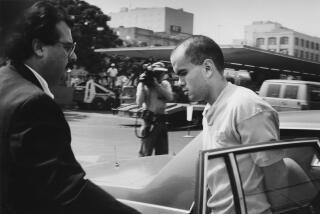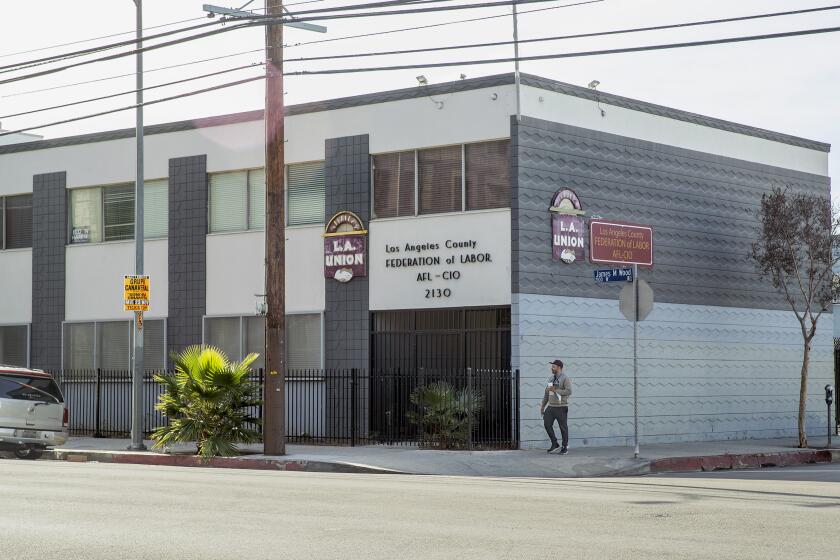Legislature Should Resolve ‘Privacy’ Issue, Reiner Says
Los Angeles County Dist. Atty. Ira Reiner suggested Wednesday that the Legislature end the current furor over a proposed crime initiative by putting the measure on the June, 1990, ballot.
In doing so, he said, the lawmakers could remove language about privacy in the initiative that Democratic Atty. Gen. John K. Van de Kamp says would threaten a woman’s right to abortion.
“I am suggesting that the Legislature take out the words that some believe threaten the California Constitution’s guarantee of privacy and then put the rest of the initiative, word for word, comma for comma, on the ballot,” Reiner said in an interview.
Tom Sneddon, incoming president of the California District Attorneys Assn., said Wednesday in a telephone interview that “Mr. Reiner’s idea is doable, it’s a good idea. I will take it up with our board this Friday.”
Also endorsing the Reiner proposal Wednesday was former San Francisco Mayor Dianne Feinstein, Van de Kamp’s opponent in the Democratic gubernatorial primary.
“It is an excellent solution and will allow us to move forward with the crime initiative,” said Feinstein, who is pro-choice on abortion but endorsed the crime initiative before the current furor arose.
But it may be difficult to win the necessary legislative approval given the volatility of the abortion issue and liberal opposition to some provisions of the initiative.
And some of Reiner’s critics will charge that he is simply trying to get out of a political bind.
Having worked to position himself in the Democratic Party as a pro-death penalty prosecutor, Reiner enthusiastically backs the crime initiative.
At the same time, in his campaign for attorney general in 1990, Reiner has to raise money from liberals who share Van de Kamp’s concern about the impact on abortion.
The Crime Victims’ Justice Reform initiative, strongly supported by district attorneys around the state, reads in part: “In criminal cases, the right of a defendant to privacy . . . shall be construed in a manner consistent with the Constitution of the United States.”
The district attorneys say their intent is to have state courts adhere to the U.S. Constitution’s guarantee against unreasonable searches and seizures.
The U.S. rule is less restrictive for police and prosecutors than the California Constitution’s guarantee of privacy, which some liberal jurists, including former state Chief Justice Rose Elizabeth Bird, have used in some criminal cases to prevent the introduction of evidence.
But Van de Kamp, seizing an issue that may help him with liberal voters in the Democratic primary for governor, demands that the words “to privacy” in the initiative be deleted.
Subordinate California’s right to privacy to the U.S. Constitution, he says, and that right is in jeopardy since there is no explicit guarantee of privacy in the U.S. Constitution.
A woman’s coalition has echoed Van de Kamp’s concern because the state Constitution’s guarantee of privacy protects a woman’s right to abortion.
But Kern County Dist. Atty. Edward Jagels maintains that, “Since abortion is a Constitutional right in California, the exercise of that right cannot be made the subject of a criminal case.”
Republican U.S. Sen. Pete Wilson, the crime initiative’s most prominent sponsor and a potential gubernatorial opponent for Van de Kamp or Feinstein, said his group cannot amend the initiative to take out the words about privacy and still gather the 650,000 signatures needed to qualify it for the June 1990 ballot.
Reiner argues that is where his proposal will help.
“By having the Legislature put the measure on the ballot, you eliminate the need to go out and requalify it,” he said.
But the chances of Reiner’s proposal going anywhere are not good. To put a constitutional amendment on the ballot, each house of the Legislature must approve it with the votes of two-thirds of its members.
“The potential for blocking this by more than a third (of legislators) representing any one of the competing philosophies is pretty great,” said Sen. Bill Lockyer (D-Hayward), chairman of the Senate Judiciary Committee, which would have to take up the Reiner proposal.
“I could see where those against abortion could block it and I could see where (criminal defense lawyers) opposed to the other reforms in the initiative could shoot it down,” Lockyer said.
But Assemblyman Richard Katz (D-Sepulveda) said he will immediately begin drafting the crime initiative as legislation--minus the words “to privacy”--in an effort to get it onto the June, 1990, ballot.
Hearing Sneddon’s endorsement of the Reiner idea, Van de Kamp saw it as a clear indication that he had prevailed in his dispute with Wilson over the crime initiative.
“It seems that a consensus is emerging which affirms my legal view that the initiative must be amended if it is not to threaten the right to abortion,” he said.
Wilson, speaking by telephone from his home in Washington, ridiculed that conclusion.
“There is a consensus of one that this is a good idea,” Wilson said. “Mr. Van de Kamp has just set a new high in whistling past the graveyard. Sen. Lockyer, with commendable candor, has predicted that there is little likelihood the Legislature will reverse its history of 20 years and enact the kinds of criminal justice reforms contained in our initiative.”
More to Read
Start your day right
Sign up for Essential California for news, features and recommendations from the L.A. Times and beyond in your inbox six days a week.
You may occasionally receive promotional content from the Los Angeles Times.






